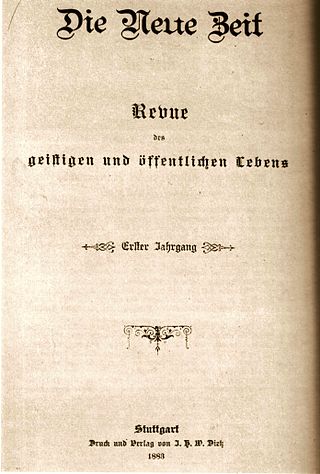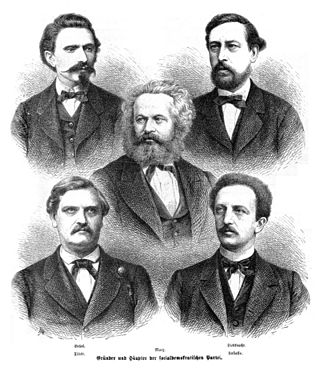Related Research Articles
Marxism–Leninism is a communist ideology that became the largest faction of the communist movement in the world in the years following the October Revolution. It was the predominant ideology of most socialist governments throughout the 20th century. Developed in Russia by the Bolsheviks, it was the state ideology of the Soviet Union, Soviet satellite states in the Eastern Bloc, and various countries in the Non-Aligned Movement and Third World during the Cold War, as well as the Communist International after Bolshevisation. Today, Marxism–Leninism is the ideology of the ruling parties of China, Cuba, Laos and Vietnam, as well as many other Communist parties. The state ideology of North Korea is derived from Marxism–Leninism. Marxist–Leninist states are commonly referred to as "communist states" by Western academics. Marxist–Leninists reject anarchism and left communism, as well as reformist socialism and social democracy. They oppose fascism and liberal democracy, and are self-proclaimed anti-imperialists. Marxism–Leninism holds that a two-stage communist revolution is needed to replace capitalism. A vanguard party, organized through democratic centralism, would seize power on behalf of the proletariat and establish a one-party socialist state, called the dictatorship of the proletariat. The state would control the means of production, suppress opposition, counter-revolution, and the bourgeoisie, and promote Soviet collectivism, to pave the way for an eventual communist society that would be classless and stateless.
Bolshevism is a revolutionary socialist current of Soviet Leninist and later Marxist–Leninist political thought and political regime associated with the formation of a rigidly centralized, cohesive and disciplined party of social revolution, focused on overthrowing the existing capitalist state system, seizing power and establishing the "dictatorship of the proletariat".

Ferdinand August Bebel was a German socialist politician, writer, and orator. He is best remembered as one of the founders of the Social Democratic Workers' Party of Germany (SDAP) in 1869, which in 1875 merged with the General German Workers' Association into the Socialist Workers' Party of Germany (SAPD). During the repression under the terms of the Anti-Socialist Laws, Bebel became the leading figure of the social democratic movement in Germany and from 1892 until his death served as chairman of the Social Democratic Party of Germany.

Julian Baltazar Józef Marchlewski was a Polish communist politician, revolutionary activist and publicist who served as chairman of the Provisional Polish Revolutionary Committee. He was also known under the aliases Karski and Kujawiak.
Paul Lensch was a war journalist, editor, author of several books and politician in the SPD. From 1912, Lensch was a member of the German Reichstag for the SPD, and in 1919 he became professor of economics at Berlin University.
Heinrich Cunow was a German Social Democratic Party politician and a Marxist theorist.

Benno Fritz Paul Alexander Konrad Haenisch was a German Social Democratic Party politician and part of "the radical Marxist Left" of German politics. He was a friend and follower of Alexander Parvus.

Die Neue Zeit was a German socialist theoretical journal of the Social Democratic Party of Germany (SPD) that was published from 1883 to 1923. Its headquarters was in Stuttgart, Germany.

Deutsche Allgemeine Zeitung was a German newspaper that appeared between 1861 and 1945.

The foundation of the Social Democratic Party of Germany can be traced back to the 1860s, and it has represented the centre-left in German politics for much of the 20th and 21st centuries. From 1891 to 1959, the SPD theoretically espoused Marxism.
Internationalist and defencist were the broad opposing camps in the international socialist movement during and shortly after the First World War. Prior to 1914, anti-militarism had been an article of faith among most European socialist parties. Leaders of the Second International had even suggested that socialist workers might foil a declaration of war by means of a general strike.

Alexander Lvovich Parvus, born Israel Lazarevich Gelfand and sometimes called Helphand in the literature on the Russian Revolution, was a Marxist theoretician, publicist, and controversial activist in the Social Democratic Party of Germany.

The Second International (1889–1916) was an organisation of socialist and labour parties, formed on 14 July 1889 at two simultaneous Paris meetings in which delegations from twenty countries participated. The Second International continued the work of the dissolved First International, though excluding the powerful anarcho-syndicalist movement. While the international had initially declared its opposition to all warfare between European powers, most of the major European parties ultimately chose to support their respective states in World War I. After splitting into pro-Allied, pro-Central Powers, and antimilitarist factions, the international ceased to function. After the war, the remaining factions of the international went on to found the Labour and Socialist International, the International Working Union of Socialist Parties, and the Communist International.

The Committee for a Workers' International (CWI) was an international association of Trotskyist political parties. Today, two groups claim to be the continuation of the CWI.
Walter Haenisch was a Marxist theoretician and the son of German SPD politician Konrad Haenisch.
Lying press is a pejorative and disparaging political term used largely for the printed press and the mass media at large. It is used as an essential part of propaganda and is thus usually dishonest or at least not based on careful research.
Crisis of Marxism was a term first employed in the 1890s after the unexpected revival of global capitalist expansion became evident after the Great Depression of Europe from 1873 to 1896, which eventually precipitated a crisis in Marxist theory. The crisis resulted in a series of theoretical debates over the significance of economic recovery for the strategy of the socialist movement, leading to ideological fragmentation and increasingly sectarian debates. By the 1890s, orthodox Marxists came to believe that capitalism was on the “verge of breakdown,” while the socialist movement was on the “verge of revolutionary triumph,” but due to a renewed burst of capitalist and industrial activity such interpretations could no longer be maintained in Western Europe.

Die Glocke Sozialistische Wochenschrift was a political magazine established in 1915 by the maverick socialist Alexander Parvus to argue that socialists should support the German war effort. It attracted Marxist theoreticians who had previously been regarded as left-wing. It was published until 1925.
Emil Kloth was a German trade unionist, who later became a Nazi official.
Kunov or Cunow is a Slavic masculine surname, its feminine counterpart is Kunova or Cunowa. Notable people with the surname include:
References
- ↑ Macnair, Mike (21 February 2013). Kautsky on Colonialism. Lulu.com. ISBN 9781291329810 . Retrieved 28 June 2018.
- ↑ Lewis, Benjamin (2014). "World War I: The SPD left's dirty secret". Weekly Worker. No. 1016, 26 June, 2014. 1016 June 26, 2014. Retrieved 21 February 2021.